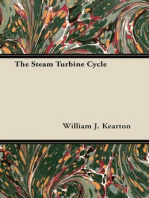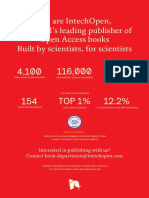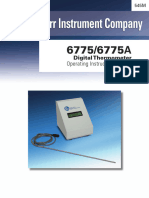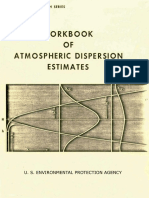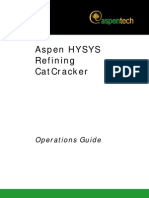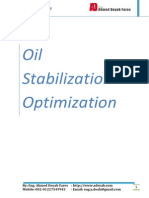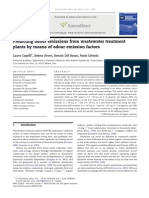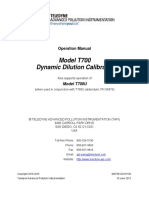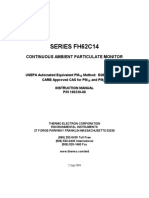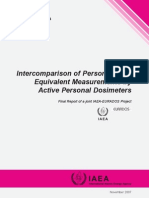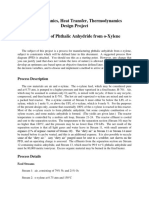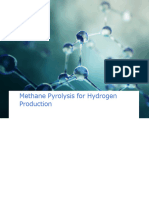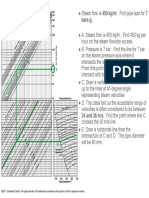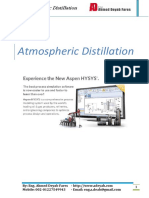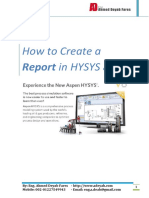0 ratings0% found this document useful (0 votes)
TEG With Hysys
TEG With Hysys
Uploaded by
Ahmad DeyabThe document describes a natural gas dehydration process using triethylene glycol (TEG). An inlet gas stream enters a free water knockout drum before being absorbed in a column. The rich TEG stream is then heated and sent to a regenerator column. Key steps include:
1) Drawing the process flow sheet.
2) Calculating the pressure drop across the valve and heat exchanger outlet temperature.
3) Studying the effect of inlet gas temperature on water content in the dry gas stream.
Copyright:
© All Rights Reserved
Available Formats
Download as PDF, TXT or read online from Scribd
Download as pdf or txt
TEG With Hysys
TEG With Hysys
Uploaded by
Ahmad Deyab0 ratings0% found this document useful (0 votes)
The document describes a natural gas dehydration process using triethylene glycol (TEG). An inlet gas stream enters a free water knockout drum before being absorbed in a column. The rich TEG stream is then heated and sent to a regenerator column. Key steps include:
1) Drawing the process flow sheet.
2) Calculating the pressure drop across the valve and heat exchanger outlet temperature.
3) Studying the effect of inlet gas temperature on water content in the dry gas stream.
Original Description:
TEG with hysys, eng. Ahmed Deyab
Original Title
TEG with hysys
Copyright
© © All Rights Reserved
Available Formats
PDF, TXT or read online from Scribd
Share this document
Did you find this document useful?
Is this content inappropriate?
The document describes a natural gas dehydration process using triethylene glycol (TEG). An inlet gas stream enters a free water knockout drum before being absorbed in a column. The rich TEG stream is then heated and sent to a regenerator column. Key steps include:
1) Drawing the process flow sheet.
2) Calculating the pressure drop across the valve and heat exchanger outlet temperature.
3) Studying the effect of inlet gas temperature on water content in the dry gas stream.
Copyright:
© All Rights Reserved
Available Formats
Download as PDF, TXT or read online from Scribd
Download as pdf or txt
0 ratings0% found this document useful (0 votes)
TEG With Hysys
TEG With Hysys
Uploaded by
Ahmad DeyabThe document describes a natural gas dehydration process using triethylene glycol (TEG). An inlet gas stream enters a free water knockout drum before being absorbed in a column. The rich TEG stream is then heated and sent to a regenerator column. Key steps include:
1) Drawing the process flow sheet.
2) Calculating the pressure drop across the valve and heat exchanger outlet temperature.
3) Studying the effect of inlet gas temperature on water content in the dry gas stream.
Copyright:
© All Rights Reserved
Available Formats
Download as PDF, TXT or read online from Scribd
Download as pdf or txt
You are on page 1/ 2
PROCESS SIMULATION CASES 2015
NG Dehydration with TEG
A gas stream is fed to the dehydration unit in order to prevent hydrate formation during
gas processing facilities. Inlet gas stream (30oC, 6200 kPa, 500 kgmole/hr) is fed to FWKO
(Free Water Knock Out drum, separator) to separate the free water from gas. The vapor
outlet from the FWKO is then fed to the bottom of the Absorber (with 8 trays, top stage
& bottom stage pressures are 6190 and 6200 kPa respectively) where water is absorbed
with TEG (tri-ethylene glycol). TEG stream containing 1% H2O by Mass at 50oC and 6200
kPa with Std Ideal liquid volume flow =0.5 m3/hr, enters the absorber from the top. After
running the Absorber, the bottom liquid outlet stream which is rich with TEG is flashed
across a valve. The outlet pressure will be back calculated. The outlet stream from the
valve is heated through the shell side of a Heat Exchanger to 105oC (outlet pressure= 110
kPa) where it exchanged heat with regenerator bottom (shell side delta P= 70 kPa,
tube side delta P= 0.7 kPa), and then entering the TEG Regenerator (Distillation Column).
The TEG Regenerator consists of 0ne stage, a Full Reflux condenser (Pressure=101 kPa,
Condenser Pressure drop=2 kPa, once you add the condenser pressure & the condenser
pressure drop; the reboiler pressure will be calculated), and a reboiler. Before running the
distillation column, two column specifications must be added. First one is a Column
Temperature spec for the condenser (102oC). The second spec is also a Column
Temperature spec but for reboiler (205oC). After running the column, the bottom liquid
outlet is fed to the tube side inlet in the previous Heat Exchanger.
Notes:
- For Heat Exchanger:
Use Simple Weighted Design as a model
- Inlet gas stream composition:
Component Mole Fraction Component Mole Fraction
N2 0.0010 i-C4 0.0059
H2S 0.0155 n-C4 0.0030
CO2 0.0284 i-C5 0.0010
C1 0.8979 n-C5 0.0005
C2 0.0310 H2O 0.0010
C3 0.0148 TEG 0.0000
- Fluid Pkg: Peng Robinson
By: Eng. Ahmed Deyab Fares
Mobile: 002-01227549943 - Email: adeyab@adeyab.com 1
PROCESS SIMULATION CASES 2015
1- Draw the process flow sheet here!
2- Calculate:
- Pressure Drop inside the Valve .. kPa
- Temperature of tube side outlet from the Heat Exchanger.oC
3- Create a case study to study the effect of changing feed stream
temperature (10- 50 oC) on the master component mole fraction of H2O in
dry gas stream from absorber and write your comment about this study.
By: Eng. Ahmed Deyab Fares
Mobile: 002-01227549943 - Email: adeyab@adeyab.com 2
You might also like
- Metodo Fotometrico para La Determinación de La Concentración de Ozono AtmosféricoNo ratings yetMetodo Fotometrico para La Determinación de La Concentración de Ozono Atmosférico8 pages
- 545M - Parr - 6775 6775A Digital Thermometer InstNo ratings yet545M - Parr - 6775 6775A Digital Thermometer Inst12 pages
- Marye Anne Fox - James K. Whitesell - Organic Chemistry-Jones and Bartlett Publishers (1994)No ratings yetMarye Anne Fox - James K. Whitesell - Organic Chemistry-Jones and Bartlett Publishers (1994)904 pages
- Interface de Comunicaciones Analizador Thermo 42CNo ratings yetInterface de Comunicaciones Analizador Thermo 42C10 pages
- Process Modeling Using HYSYS With Refinery FocusNo ratings yetProcess Modeling Using HYSYS With Refinery Focus202 pages
- Dispersión Atmosférica de ContaminaciónNo ratings yetDispersión Atmosférica de Contaminación86 pages
- MODEL T700 - Dynamic Dilution CalibratorNo ratings yetMODEL T700 - Dynamic Dilution Calibrator366 pages
- Cost Energy and Material Analysis of Biodiesel Production Using Homogeneous and Heterogeneous CatalystNo ratings yetCost Energy and Material Analysis of Biodiesel Production Using Homogeneous and Heterogeneous Catalyst96 pages
- 1691 Workbook Atmospheric Dispersion Estimates 19710% (1)1691 Workbook Atmospheric Dispersion Estimates 197192 pages
- Modeling and Simulation of Wind TurbinesNo ratings yetModeling and Simulation of Wind Turbines128 pages
- Guidance On The Assessment of Odour For Planning: Version 1.1 - July 2018No ratings yetGuidance On The Assessment of Odour For Planning: Version 1.1 - July 201850 pages
- Wind Plant Preconstruction Energy Estimates: Current Practice and OpportunitiesNo ratings yetWind Plant Preconstruction Energy Estimates: Current Practice and Opportunities72 pages
- Petroleum Refining Materials and EquipmentNo ratings yetPetroleum Refining Materials and Equipment23 pages
- Hysys Workbook Part-1: By: Eng. Ahmed Deyab100% (1)Hysys Workbook Part-1: By: Eng. Ahmed Deyab23 pages
- Valves: 1 - Gate 2 - Plug 3 - Globe 4 - Ball 5 - Butterfly 6 - Diaphragm 7 - Pinch 8 - Relief 9 - CheckNo ratings yetValves: 1 - Gate 2 - Plug 3 - Globe 4 - Ball 5 - Butterfly 6 - Diaphragm 7 - Pinch 8 - Relief 9 - Check1 page
- Sherwood/Leva/Eckert GPDC Pressure Drop Correlation For Packing100% (1)Sherwood/Leva/Eckert GPDC Pressure Drop Correlation For Packing3 pages
- Basic Instrumentation Measuring Devices and Basic Pid ControlNo ratings yetBasic Instrumentation Measuring Devices and Basic Pid Control125 pages
- LinkedIn-Pump Vendor Data Sheet and Curve PDF100% (1)LinkedIn-Pump Vendor Data Sheet and Curve PDF9 pages
- Active Energy Efficiency Using Speed ControlNo ratings yetActive Energy Efficiency Using Speed Control25 pages
- Adaptations For Skunks and Skunk CabbageNo ratings yetAdaptations For Skunks and Skunk Cabbage10 pages
- Currents, Waves, Tides: Term Info PictureNo ratings yetCurrents, Waves, Tides: Term Info Picture4 pages
- Predicting_Embankment_Dam_Breach_Parameters_-_A_NeNo ratings yetPredicting_Embankment_Dam_Breach_Parameters_-_A_Ne8 pages
- Culvert Sizing Procedure For 100 Year Work Flow PDFNo ratings yetCulvert Sizing Procedure For 100 Year Work Flow PDF10 pages
- Best Practices For RGB Compositing of Multi-Spectral ImageryNo ratings yetBest Practices For RGB Compositing of Multi-Spectral Imagery8 pages
- August 2012-Article Cooling Towers Correct and Best SelectionNo ratings yetAugust 2012-Article Cooling Towers Correct and Best Selection3 pages
- Chenglepet Disaster Management Plan - 2021100994No ratings yetChenglepet Disaster Management Plan - 2021100994470 pages
- DN Beginning Acting Lesson Plan Younger Kids86% (7)DN Beginning Acting Lesson Plan Younger Kids19 pages
- Science Verification Observations On VLT-UT1 Completed: Observing With The VLTNo ratings yetScience Verification Observations On VLT-UT1 Completed: Observing With The VLT48 pages
- Richard Alejandro Ferdinand S1 PBL Presentation QUEBECNo ratings yetRichard Alejandro Ferdinand S1 PBL Presentation QUEBEC14 pages



